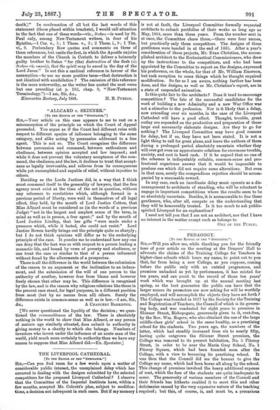" ALLCARD v. SKINNER."
[To TITS EDITOR OP TEM "SPECTAT08.1
SIE,—Your article on this case appears to me to rest on a misconception of the principle on which the Court of Appeal proceeded. You argue as if the Court had different rules with respect to different species of influence belonging to the same category, and alike acting by persuasion addressed to a free agent. This is not so. The Court recognises the difference between persuasion and command, between enthusiasm and obedience, between opinion accepted and law imposed ; and while it does not prevent the voluntary acceptance of the com- mand, the obedience, and the law, it declines to treat that accept- ance as legally irrevocable, and relieves from its consequences while yet uncompleted and capable of relief, without injustice to others.
Deciding as the Lords Justices did, in a way that I think must commend itself to the generality of lawyers, that the free agency must exist at the time of the act in question, without any reference to resolutions which, although formed in a previous period of liberty, were void in themselves of all legal effect, they held, by the mouth of Lord Justice Cotton, that Miss Allcard most be considered as (in the words of a previous Judge) "not in the largest and amplest sense of the term, in mind as well as in person, a free agent ;" and by the month of Lord Justice Lindley, that her gifts "were made under a pressure which, while it lasted, she could not resist." Lord Justice Bowen hardly brings out the principle quite so sharply ; bat I do not think opinions will differ as to the underlying principle of the case. It puzzles me to understand how any one can deny that the fact was so with respect to a person leading a monastic life, and bound by vows of poverty and obedience, or can treat the case as similar to that of a person influenced without fraud by the allurements of a prospectus.
There is all the difference in the world between the submission of the reason to an argument or the inclination to an induce- ment, and the submission of the will of one person to the authority of another, however free from blame and however freely chosen that other may be. This difference is recognised by the law, and is the reason why religious relations like those in the present case stand, for legal purposes, in a different position from most (but by no means from all) others. Surely the difference exists in common-sense as well as in law.—I am, Sir, [We never questioned the legality of the decision ; we ques- tioned the reasonableness of the law. There is absolutely nothing in the world to show that Miss Allcard, or any person of mature age similarly situated, does submit to authority in giving money to a charity to which she belongs. Numbers of investors who invest under the influence of an acute man of the world, yield much more certainly to authority than we have any reason to suppose that Miss Allcard did.—En. Spectator.]


































 Previous page
Previous page